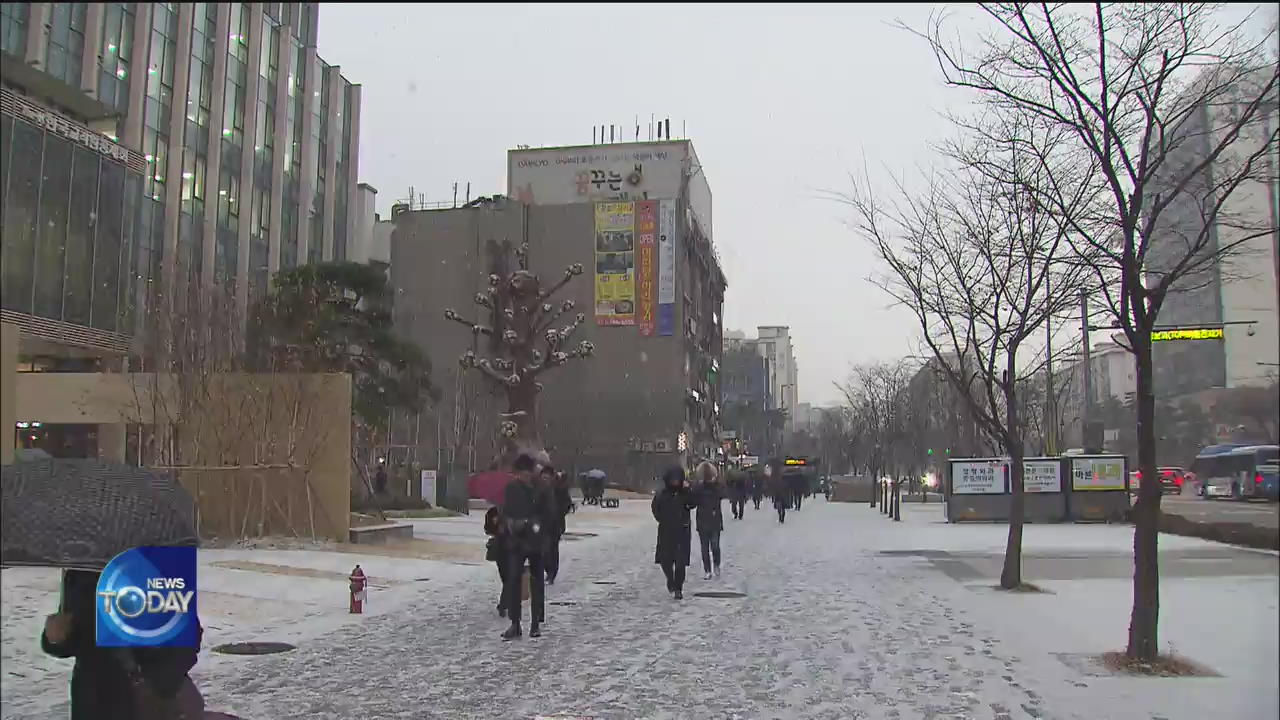DECREASE IN SNOW IN THE NATION
입력 2020.01.06 (15:10)
수정 2020.01.06 (16:46)
읽어주기 기능은 크롬기반의
브라우저에서만 사용하실 수 있습니다.
[Anchor Lead]
Snow is a rarity this winter as an unusually balmy weather continues. Seoul and other major cities in Korea saw almost no snow accumulation last month as the average snowfall nationwide stood at merely 0.3 centimeters.
[Pkg]
January is traditionally the coldest month here in Korea, but people are seen dressed lighter than previous years at Hangang riverside park. The daily highs are about five degrees higher than what would be the norm during this time of the year. It feels more like late February. This is usually when the Hangang River freezes over. But it's a totally different scene this winter.
[Soundbite] KWON JAE-HYEON(SEOUL RESIDENT) : "The Hangang River should be frozen and the streets should be covered in snow by now. But we haven't seen much snow this year."
In fact, last month's snowfall averaged only 0.3 centimeters nationwide, the smallest amount since Korea started climate observation in 1973. No snowfalls recorded in Incheon, Daejeon and Gwangju. Although there was light snow in Seoul, there was no recordable level of snowfall. It wasn't cold enough to snow as the average temperature last month stood at 2.8 degrees Celsius, 1.3 degrees higher than previous years. The temperatures in the Siberian region determine how cold it would be on the Korean Peninsula. Warmer weather in Siberia this year has weakened the cold, high pressure front in the continent and the warmer water temperature in the West Pacific to the south of Korea, about one degree higher than usual, blocked out the cold air from the north.
[Soundbite] YUN KI-HAN(WEATHER FORECASTER, KOREA METEOROLOGICAL ADMINISTRATION) : "Snow clouds form over the West Sea when cold high pressure from the continent surges over to Korea. But this rarely happened last month."
This weather pattern is expected to continue for the time being. Rain and snow clouds are projected to pass over the entire country for the next three days, but most areas will see only rain, with the exception of the cold Gangwon region where a snowstorm is expected to dump up to 50 centimeters of snow.
Snow is a rarity this winter as an unusually balmy weather continues. Seoul and other major cities in Korea saw almost no snow accumulation last month as the average snowfall nationwide stood at merely 0.3 centimeters.
[Pkg]
January is traditionally the coldest month here in Korea, but people are seen dressed lighter than previous years at Hangang riverside park. The daily highs are about five degrees higher than what would be the norm during this time of the year. It feels more like late February. This is usually when the Hangang River freezes over. But it's a totally different scene this winter.
[Soundbite] KWON JAE-HYEON(SEOUL RESIDENT) : "The Hangang River should be frozen and the streets should be covered in snow by now. But we haven't seen much snow this year."
In fact, last month's snowfall averaged only 0.3 centimeters nationwide, the smallest amount since Korea started climate observation in 1973. No snowfalls recorded in Incheon, Daejeon and Gwangju. Although there was light snow in Seoul, there was no recordable level of snowfall. It wasn't cold enough to snow as the average temperature last month stood at 2.8 degrees Celsius, 1.3 degrees higher than previous years. The temperatures in the Siberian region determine how cold it would be on the Korean Peninsula. Warmer weather in Siberia this year has weakened the cold, high pressure front in the continent and the warmer water temperature in the West Pacific to the south of Korea, about one degree higher than usual, blocked out the cold air from the north.
[Soundbite] YUN KI-HAN(WEATHER FORECASTER, KOREA METEOROLOGICAL ADMINISTRATION) : "Snow clouds form over the West Sea when cold high pressure from the continent surges over to Korea. But this rarely happened last month."
This weather pattern is expected to continue for the time being. Rain and snow clouds are projected to pass over the entire country for the next three days, but most areas will see only rain, with the exception of the cold Gangwon region where a snowstorm is expected to dump up to 50 centimeters of snow.
■ 제보하기
▷ 카카오톡 : 'KBS제보' 검색, 채널 추가
▷ 전화 : 02-781-1234, 4444
▷ 이메일 : kbs1234@kbs.co.kr
▷ 유튜브, 네이버, 카카오에서도 KBS뉴스를 구독해주세요!
- DECREASE IN SNOW IN THE NATION
-
- 입력 2020-01-06 15:15:49
- 수정2020-01-06 16:46:05

[Anchor Lead]
Snow is a rarity this winter as an unusually balmy weather continues. Seoul and other major cities in Korea saw almost no snow accumulation last month as the average snowfall nationwide stood at merely 0.3 centimeters.
[Pkg]
January is traditionally the coldest month here in Korea, but people are seen dressed lighter than previous years at Hangang riverside park. The daily highs are about five degrees higher than what would be the norm during this time of the year. It feels more like late February. This is usually when the Hangang River freezes over. But it's a totally different scene this winter.
[Soundbite] KWON JAE-HYEON(SEOUL RESIDENT) : "The Hangang River should be frozen and the streets should be covered in snow by now. But we haven't seen much snow this year."
In fact, last month's snowfall averaged only 0.3 centimeters nationwide, the smallest amount since Korea started climate observation in 1973. No snowfalls recorded in Incheon, Daejeon and Gwangju. Although there was light snow in Seoul, there was no recordable level of snowfall. It wasn't cold enough to snow as the average temperature last month stood at 2.8 degrees Celsius, 1.3 degrees higher than previous years. The temperatures in the Siberian region determine how cold it would be on the Korean Peninsula. Warmer weather in Siberia this year has weakened the cold, high pressure front in the continent and the warmer water temperature in the West Pacific to the south of Korea, about one degree higher than usual, blocked out the cold air from the north.
[Soundbite] YUN KI-HAN(WEATHER FORECASTER, KOREA METEOROLOGICAL ADMINISTRATION) : "Snow clouds form over the West Sea when cold high pressure from the continent surges over to Korea. But this rarely happened last month."
This weather pattern is expected to continue for the time being. Rain and snow clouds are projected to pass over the entire country for the next three days, but most areas will see only rain, with the exception of the cold Gangwon region where a snowstorm is expected to dump up to 50 centimeters of snow.
Snow is a rarity this winter as an unusually balmy weather continues. Seoul and other major cities in Korea saw almost no snow accumulation last month as the average snowfall nationwide stood at merely 0.3 centimeters.
[Pkg]
January is traditionally the coldest month here in Korea, but people are seen dressed lighter than previous years at Hangang riverside park. The daily highs are about five degrees higher than what would be the norm during this time of the year. It feels more like late February. This is usually when the Hangang River freezes over. But it's a totally different scene this winter.
[Soundbite] KWON JAE-HYEON(SEOUL RESIDENT) : "The Hangang River should be frozen and the streets should be covered in snow by now. But we haven't seen much snow this year."
In fact, last month's snowfall averaged only 0.3 centimeters nationwide, the smallest amount since Korea started climate observation in 1973. No snowfalls recorded in Incheon, Daejeon and Gwangju. Although there was light snow in Seoul, there was no recordable level of snowfall. It wasn't cold enough to snow as the average temperature last month stood at 2.8 degrees Celsius, 1.3 degrees higher than previous years. The temperatures in the Siberian region determine how cold it would be on the Korean Peninsula. Warmer weather in Siberia this year has weakened the cold, high pressure front in the continent and the warmer water temperature in the West Pacific to the south of Korea, about one degree higher than usual, blocked out the cold air from the north.
[Soundbite] YUN KI-HAN(WEATHER FORECASTER, KOREA METEOROLOGICAL ADMINISTRATION) : "Snow clouds form over the West Sea when cold high pressure from the continent surges over to Korea. But this rarely happened last month."
This weather pattern is expected to continue for the time being. Rain and snow clouds are projected to pass over the entire country for the next three days, but most areas will see only rain, with the exception of the cold Gangwon region where a snowstorm is expected to dump up to 50 centimeters of snow.
이 기사가 좋으셨다면
-
좋아요
0
-
응원해요
0
-
후속 원해요
0














![[단독] 우리은행 부당대출 47억 원, 기소 누락 뒤 추가 송치](/data/news/2025/07/02/20250702_RyG3im.jpg)


이 기사에 대한 의견을 남겨주세요.